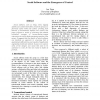Free Online Productivity Tools
i2Speak
i2Symbol
i2OCR
iTex2Img
iWeb2Print
iWeb2Shot
i2Type
iPdf2Split
iPdf2Merge
i2Bopomofo
i2Arabic
i2Style
i2Image
i2PDF
iLatex2Rtf
Sci2ools
107
click to vote
ICALT
2006
IEEE
2006
IEEE
Social Software and the Emergence of Control
Social software, such as blogs, wikis, tagging systems and collaborative filters, treats the group as a first-class object within the system. Drawing from theories of transactional distance and control, this paper proposes a model of e-learning that extends traditional concepts of learner-teacher-content interactions to include these emergent properties of the group. It suggests that this feature of social software can facilitate an approach to e-learning that is qualitatively different from and capable of significantly augmenting traditional methods. It goes on to explore some of the dangers and issues that need to be addressed in order for this new model to fulfill its promise.
Related Content
| Added | 11 Jun 2010 |
| Updated | 11 Jun 2010 |
| Type | Conference |
| Year | 2006 |
| Where | ICALT |
| Authors | Jon Dron |
Comments (0)

